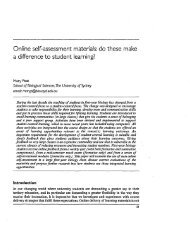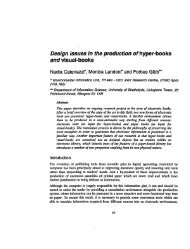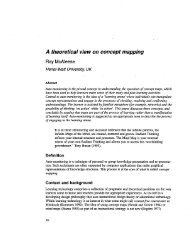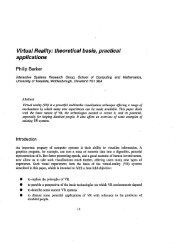Download (2177Kb) - ALT Open Access Repository - Association for ...
Download (2177Kb) - ALT Open Access Repository - Association for ...
Download (2177Kb) - ALT Open Access Repository - Association for ...
You also want an ePaper? Increase the reach of your titles
YUMPU automatically turns print PDFs into web optimized ePapers that Google loves.
0049 WS: Revisiting Storyboards<br />
Re-visiting Storyboards <strong>for</strong> E-learning<br />
Author<br />
Simon Fitzpatrick<br />
Theme<br />
Making things happen<br />
Tags<br />
educationalDesign,<br />
instructionalDesign,<br />
instructionalStrategy,<br />
learningDesign, storyboarding<br />
This hands-on workshop will enable delegates to employ a range of<br />
strategies to design and develop effective e-learning materials. Our aim is to<br />
show how effective storyboarding is an essential part of the development of<br />
high quality e-learning.<br />
The key to effective learning is good planning, identifying learner needs,<br />
evaluating tools and approaches and delivering an appropriate solution –<br />
in terms of e-learning, the well-established and successful Netskills workshops<br />
on e-learning cover this process in some detail. In commercial and<br />
educational e-learning many developers appear to <strong>for</strong>get the basics and lose<br />
themselves in ‘rapid’ development or new technology ‘overload’. Rapid development<br />
is desirable but not at the expense of quality: rapid or agile development<br />
promotes course development within an authoring environment<br />
and whilst many instructional designers (IDs) are com<strong>for</strong>table designing and<br />
developing the learning process within this type of tool, recent experience<br />
suggests that the rapid approach can lead to blander, ‘mass produced’ e-<br />
learning material that is not always relevant or appropriate to learner needs.<br />
Most instructional designers agree on the significance of storyboarding as<br />
the link between instructional strategy and course authoring – the main<br />
benefits are:<br />
• The involvement of users as co-developers<br />
• The ability to visualise the learning process<br />
• Accountability in the <strong>for</strong>m of an audit trail of requirements<br />
There are numerous ways of achieving this in practice along with a diverse<br />
range of tools – we there<strong>for</strong>e suggest that whilst ‘rapid’ development is<br />
attractive, the process of design through storyboarding and the iterative<br />
consultation with the Subject Matter Expert (SME) will ultimately lead to a<br />
better quality output.<br />
In this workshop, there<strong>for</strong>e, delegates will be able to examine the process of<br />
developing an instructional strategy by working through learning scenarios<br />
in small groups and then following them through the storyboarding process<br />
and into the authoring environment. Where possible we will explore a range<br />
of styles and processes as well as looking at a range of storyboarding tools.<br />
After feeding back to each other, the workshop will conclude with a short<br />
discussion.<br />
References<br />
Becker, D. Elearning Storyboarding 101. Word of Mouth, the Articulate Blog. 2011. <strong>Access</strong>ed 20 May<br />
2011 www.articulate.com/blog/elearning-storyboarding-101/<br />
Brandon, B., (2004). Storyboards tailored to you: Do-it-yourself magic arrows. The E-learning<br />
Developer’s Journal (May 2004): 1-8.<br />
Booth, A., Levy, P., Bath, P. A., Lacey, T., Sanderson, M. and Diercks-O’Brien, G. (2005), Studying<br />
health in<strong>for</strong>mation from a distance: refining an e-learning case study in the crucible of student<br />
evaluation. Health In<strong>for</strong>mation & Libraries Journal 22 (2005): 8–19.<br />
Madsen, KH., and Aiken, PH. Experiences using cooperative interactive storyboard prototyping.<br />
Commun. ACM 36, 6 (June 1993): 57-64.<br />
Sakurai, Y., Dohi, S., Tsuruta, S., & Knauf, R. Modeling Academic Education Processes by Dynamic<br />
Storyboarding. Educational Technology & Society, 12 (2009): 307–333.<br />
Reeder,K. (2004) Visual Storyboarding Provides a Conceptual Bridge from Research to Development.<br />
Technology Teacher, 65 (2004): 3-9.<br />
Boyle, T., Cook, J., Windle, R., Wharrad, H., Leeder, D. & Alton, R. Agile methods <strong>for</strong> developing<br />
learning objects. Proceedings of the 23rd ASCILITE Conference. <strong>Access</strong>ed May 20, 2011, <br />
35







